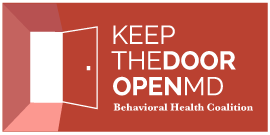Download full press release here.
Annapolis, Md. (December 21, 2016) – A broad coalition of nonprofit organizations announced that its top legislative priority for the 2017 Maryland General Assembly will be the Keep the Door Open Act, sponsored by Senator Guy Guzzone (District 13) and Delegate Antonio Hayes (District 40). The Maryland Behavioral Health Coalition supports the Act to address the state’s growing demand for high-quality, accessible behavioral health care treatment. Behavioral health is a term that covers the full range of mental and emotional well-being, including mental health and substance use disorders.
More than one million Marylanders live with mental health or substance use disorders. Additionally, more than 180,000 Maryland children and adults use and depend on the public behavioral health system. Advocates say that demand for services is steadily increasing in Maryland, with the number of people using our public mental health system increasing 65 percent since the start of the recent economic downturn.
Similar legislation passed the Senate last year in the 2016 session with a 35-9 bipartisan vote. The bill’s sponsors are optimistic that they can build on that momentum in the upcoming 2017 session.
“Demand for mental health and substance use treatment is increasing,” said Senator Guzzone. “We can’t run away from this problem anymore – we need solutions so that Marylanders can get the critical healthcare treatment they need.”
Coalition members say that dramatic increases in hospital admissions and emergency department visits associated with Medicaid lead to increased public spending at a time when analysts project a state budget shortfall. Advocates say that the Keep the Door Open Act will help community health clinics and other behavioral health providers treat patients before more costly hospital or emergency care is needed.
“We know behavioral health treatment works, and we need to make it more accessible,” said Delegate Hayes. “Now is the time for Maryland to ensure dependable access to community health providers.”
The legislation indexes the behavioral health provider rates, which have only had six modest increases in more than 20 years, to the cost of medical inflation. Advocates say the Keep the Door Open Act is critical to strengthen the workforce and retain qualified licensed professionals and direct care workers by ensuring fair and stable provider rates. Community behavioral health providers administer traditional outpatient services, mobile treatment, crisis services, withdrawal management, rehabilitation, residential treatment, partial hospitalization programs and housing.
“Without this legislation, we fear that our front-line community behavioral health providers may be forced to close up shop,” said Dan Martin, director of public policy for the Mental Health Association of Maryland. “We don’t want Marylanders who urgently need behavioral health care to find closed doors.”
Coalition members also point out that Maryland remains in an opioid crisis, with deaths and overdoses from heroin continuing to increase.
“If we want to stem this opioid epidemic, we need more community services, recovery support and preventive care,” said Dr. Nancy Rosen-Cohen, executive director of the National Council on Alcoholism and Drug Dependence, Maryland Chapter. “We need to reach people early – and community health services are the best way to do that.”
The Behavioral Health Coalition also supports initiatives to ensure that Marylanders with health insurance can access crisis services and to create long-term funding in the state budget for additional treatment resources to combat Maryland’s opioid epidemic. The Coalition has scheduled a “Keep the Door Open Maryland” rally for February 23 at noon on Lawyers Mall in Annapolis. More than 500 attendees are expected to attend and support the coalition’s legislative platform.
Media Contact:
Chris Trumbauer, The Hatcher Group, 410-990-0284
Senator Guy Guzzone, 410-841-3572
Delegate Antonio Hayes, 410-841-3545
Dan Martin, Mental Health Association of Maryland, 410-978-8865
Dr. Nancy Rosen-Cohen, National Council on Alcoholism and Drug Dependence – Maryland 410-625-6482
